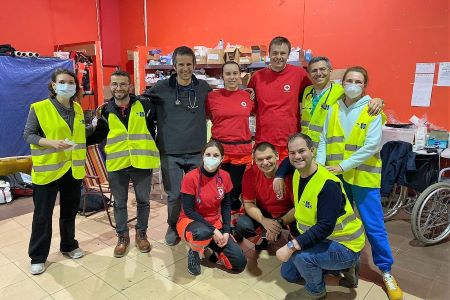
Excerpted and translated from the March 18 issue of the Israeli newspaper Kol Ha’ir
They left everything and came here scared and exhausted. This is the testimony of members of the Hadassah Medical Organization (HMO) humanitarian team currently providing medical care at the refugee camp in Przemyśl on the Ukrainian-Polish border.
Members of the Hadassah team are experiencing tragic moments but are relieving pain and saving lives, as they aid thousands of Ukrainian refugees who fled their homes and their homeland.

Wars are a terrible thing, and the scenes from Ukraine as seen on TV are shocking. Take that and multiply it many times and that’s what you get if you are experiencing this inferno in person.
Dr. Shaul Beyth, deputy head of Hadassah Hospital Ein Kerem’s Orthopedic Surgery Department; Dr. Yaarit Ribak, internal medicine, and immunology expert; and Dr. Asaf Kedar, head of the Trauma Unit at Hadassah Hospital Mount Scopus, spearheaded Hadassah’s humanitarian initiative. The first physicians to arrive, their mission was to assess the situation, together with Hadassah International Executive Director Jorge Diener, and to report back to HMO administrators, the HMO board of directors, and Hadassah, The Women’s Zionist Organization of America, as to what was needed to help the refugees.
The initial Hadassah team met with directors of the large university hospital in Lublin, Poland, and, based on their own experiences in dealing with such events in Hadassah’s trauma units, began training staff to handle mass casualty events.

The following week saw the arrival of additional HMO medical personnel—triage nurse Dana Ben-Bassat, Ukrainian-born vascular surgery nurse Natan Loifman, pediatric pulmonologist, and sleep-disorder expert Dr. Alex Gileles-Hillel, pediatrician Dr. Yuval Gutbir and infectious disease expert Dr. Meir Cherniak.
The mission team’s hands are full as they work with dedication around the clock.
DONATE NOW
“Meir and Dana treated a grandmother with a leaking stoma, an artificial opening to the stomach, which was causing her a lot of pain,” says Dr. Gileles-Hillel. “She was afraid. They saw the fear in her eyes. After providing initial treatment and giving her time to rest and feel calmer, they sent her to the hospital.”
Dr. Gileles-Hillel continues, “Meanwhile, I treated a boy with suspected appendicitis. His mom insisted that he not be hospitalized right away. My diagnosis was accurate but I understood the mother’s feelings. So I gave him analgesics and sent him for observation with the understanding that if his situation worsened, he returned to me. After half an hour, his grandmother, a surgery nurse, returned with him, saying she agreed with my diagnosis and that he needed to be hospitalized.”
Dr. Gileles-Hillel also examined a frightened 7-year-old boy with stomach pain, who was trembling with fear. “He said his name was Sasha,” Dr. Gileles-Hillel relates. “I told him that was my name, too, and I almost cried in front of him.”
Dr. Ribak shares another patient’s story. A 76-year-old great-grandmother was forced to leave her home in Zhytomyr to escape the explosions. The woman didn’t want to leave her house, but when the bombing became so frequent and a rocket landed close to her home, she realized there was no choice other than to leave Zhytomyr to stay alive.
“The great-grandmother was taken out of Zhytomyr in a vehicle by locals who were also fleeing the bombing,” Dr. Ribak says. “She was taken to the Polish border, and that’s how she got to the refugee camp. Because she was suffering from severe back pain, she was brought to the Red Cross medical station where the Hadassah team was working.” That’s where Dr. Ribak met her and treated her pain.
The great-grandmother planned to go to Prague, where family friends of her daughter would receive her—people she’d never met and hadn’t even heard of until now.
“I’ve never been to Prague,” she said as the tears rolled. “I hope to go home one day to Zhytomyr if anything remains of it.”
